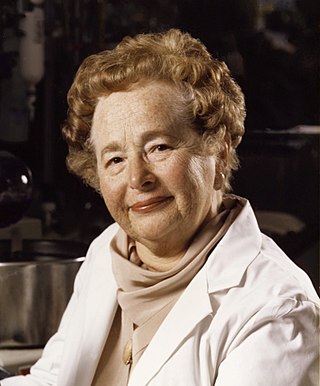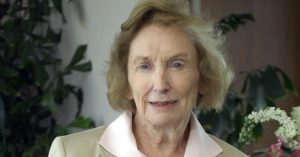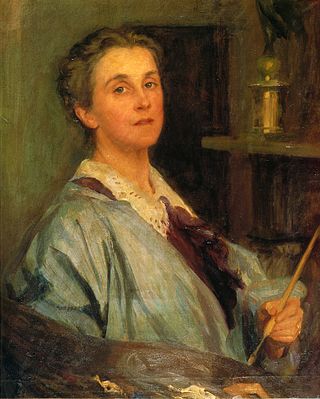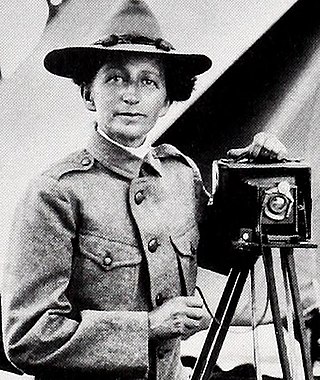
Ellen Anderson Gholson Glasgow was an American novelist who won the Pulitzer Prize for the Novel in 1942 for her novel In This Our Life. She published 20 novels, as well as short stories, to critical acclaim. A lifelong Virginian, Glasgow portrayed the changing world of the contemporary South in a realistic manner, differing from the idealistic escapism that characterized Southern literature after Reconstruction.

Gertrude "Trudy"Belle Elion was an American biochemist and pharmacologist, who shared the 1988 Nobel Prize in Physiology or Medicine with George H. Hitchings and Sir James Black for their use of innovative methods of rational drug design for the development of new drugs. This new method focused on understanding the target of the drug rather than simply using trial-and-error. Her work led to the creation of the anti-retroviral drug AZT, which was the first drug widely used against AIDS. Her well known works also include the development of the first immunosuppressive drug, azathioprine, used to fight rejection in organ transplants, and the first successful antiviral drug, acyclovir (ACV), used in the treatment of herpes infection.

Dubravka Ugrešić was a Yugoslav-Croatian and Dutch writer. A graduate of University of Zagreb, she was based in Amsterdam since 1996; she was identified as a Yugoslav writer.

Julia Alvarez is an American New Formalist poet, novelist, and essayist. She rose to prominence with the novels How the García Girls Lost Their Accents (1991), In the Time of the Butterflies (1994), and Yo! (1997). Her publications as a poet include Homecoming (1984) and The Woman I Kept to Myself (2004), and as an essayist the autobiographical compilation Something to Declare (1998). Many literary critics regard her to be one of the most significant Latina writers and she has achieved critical and commercial success on an international scale.

Ellen Foster is a 1987 novel by American novelist Kaye Gibbons. It was a selection of Oprah's Book Club in October 1997.

Sarah Dessen is an American novelist who lives in Chapel Hill, North Carolina. Born in Illinois, Dessen graduated from the University of North Carolina-Chapel Hill. Her first book, That Summer, was published in 1996. She has since published more than a dozen other novels and novellas. In 2017, Dessen won the Margaret Edwards Award for some of her work. Two of her books were adapted into the 2003 film How to Deal.
Mary Ellen Snodgrass is an American educator and writer of textbooks and general reference works.

Elizabeth Spencer was an American writer. Spencer's first novel, Fire in the Morning, was published in 1948. She wrote a total of nine novels, seven collections of short stories, a memoir, and a play. Her novella The Light in the Piazza (1960) was adapted for the screen in 1962 and transformed into a Broadway musical of the same name in 2005. She was a five-time recipient of the O. Henry Award for short fiction.
Doris Betts was a short story writer, novelist, essayist and Alumni Distinguished Professor Emerita at University of North Carolina at Chapel Hill. She was the author of three short story collections and six novels.

Lydia Field Emmet was an American artist best known for her work as a portraitist. She studied with, among others, prominent artists such as William Merritt Chase, Harry Siddons Mowbray, Kenyon Cox and Tony Robert-Fleury. Emmet exhibited widely during her career, and her paintings can now be found hanging in the White House, and many prestigious art galleries, including the Metropolitan Museum of Art.

John Hill Wheeler (1806–1882) was an American attorney, politician, historian, planter and slaveowner. He served as North Carolina State Treasurer (1843–1845), and as United States Minister to Nicaragua (1855–1856).

On the morning of March 5, 2008, Eve Marie Carson was shot and killed in Chapel Hill, North Carolina, United States where she was a student at the University of North Carolina at Chapel Hill.
Louise Ann Dolan is an American mathematical physicist and professor of physics at the University of North Carolina at Chapel Hill. She does research in theoretical particle physics, gauge theories, gravity, and string theory, and is generally considered to be one of the foremost experts worldwide in this field. Her work is at the forefront of particle physics today.
Melanie Sumner is an American writer and college professor. She was acclaimed as one of "America's Best Young Novelists" in 1995. Writer Jill McCorkle says, "She comes to her characters with this wealth of knowledge. She's so well-versed in those wonderful little details that make up Southern towns. She has such a rich expanse of her fictional turf wildly varied and yet always occupied with this kind of social manners and morals and taboos."
Jacquelyn Dowd Hall is an American historian and Julia Cherry Spruill Professor Emerita at the University of North Carolina at Chapel Hill. Her scholarship and teaching forwarded the emergence of U.S. women's history in the 1960s and 1970s, helped to inspire new research on Southern labor history and the long civil rights movement, and encouraged the use of oral history sources in historical research. She is the author of Revolt Against Chivalry: Jessie Daniel Ames and the Women’s Campaign Against Lynching;Like a Family: The Making of a Southern Cotton Mill World and Sisters and Rebels: The Struggle for the Soul of America.
Jean Fagan Yellin was an American historian specializing in women's history and African-American history, and Distinguished Professor Emerita of English at Pace University. She is best known for her scholarship on escaped slave, abolitionist, and author Harriet Jacobs.
Mary Ellen Jones was an American biochemist. She was notable for discovery of carbamoyl phosphate, a chemical substance that is key to the biosynthesis of arginine and urea, and for the biosynthesis of pyrimidine nucleotides. Jones became the first woman to hold a chair at the University of North Carolina at Chapel Hill, and the first woman to become a department chair at the medical school. She was a member of the National Academy of Sciences. She was also president of the Association of Medical School Departments of Biochemistry, president of the American Society for Biochemistry and Molecular Biology, and president of the American Association of University Professors. The New York Times called her a "crucial researcher on DNA" and said that her studies laid the foundation for basic cancer research. She died of cancer on August 23, 1996.
Grace Beacham Freeman was an American poet, columnist, short story writer and educator. She wrote a syndicated column "At Our House" from 1954 to 1964 and was named by Governor Richard Wilson Riley as the fourth South Carolina Poet Laureate from 1985 to 1986.

Louis Decimus Rubin Jr. was a noted American literary scholar and critic, writing teacher, publisher, and writer. He is credited with helping to establish Southern literature as a recognized area of study within the field of American literature, as well as serving as a teacher and mentor for writers at Hollins College and the University of North Carolina at Chapel Hill; and for founding Algonquin Books of Chapel Hill, a publishing company nationally recognized for fiction by Southern writers. He died in Pittsboro, North Carolina and is buried at the Kahal Kadosh Beth Elohim Cemetery in Charleston, South Carolina.

Mary Bayard Morgan Wootten (1875–1959) was an American photographer. She named Pepsi Cola and created its iconic logo for her neighbor Caleb Bradham, who invented the iconic drink.











